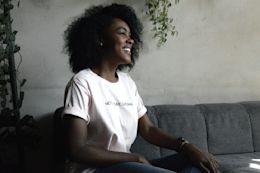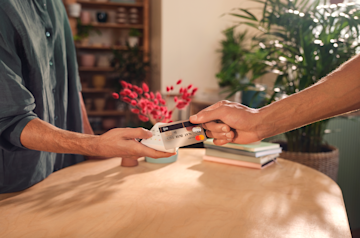
Improving financial equity for women
N26 speaks with Alina Grotz from Women for Women International to learn how we can level the financial playing field for women globally – and why it matters.
6 min read
According to the UN, women achieving financial inclusion is a key driving factor to help end poverty by 2030. To help us understand how we can better support women in reaching this essential level of representation, Alina Grotz, of Women for Women International, shared some valuable insights with us.Worldwide, just 47% of women participate in the labor force compared to 72% of men. This lack of access to work means that globally, 56% of those without a bank account are women. As a result, nearly a billion women worldwide are unbanked yet, this financial gender disparity plays out unequally on the world stage. For example, less than 30% of loans from commercial banks in countries such as Pakistan and South Sudan are taken out by women. In contrast, nearly 50% of borrowers in European countries such as Denmark and Poland are women.In her line of work, Alina has witnessed this imbalance first-hand. “In the communities where we work, women’s lack of access to education, job opportunities, and loans has led to a significant pay and wealth gap: Women earn less and are therefore less likely to accumulate wealth. According to studies, at the current rate of progress, it will take 132 years to reach full parity when it comes to equal pay.”The lack of representation in finance has far-reaching consequences. “Representation matters,” Alina states, “and this holds true for all spheres of life. If women and other marginalized groups are not represented in financial conversations, they will feel less empowered to take on a career in this sector. This is – again – part of a vicious circle. The notion of women having less affinity for numbers, finances, and mathematics is outdated in many parts of the Western world. However, in the countries we work in, women are often not given a seat at the table. This reproduces a system of dependence and is a structural, deeply rooted aspect of patriarchal power imbalances.” Additionally, Alina points out, “seeing women in finance succeed and represented in panels, platforms, and interviews can encourage women to go choose a similar career path – ultimately tackling the persisting underrepresentation in executive roles. Therefore, amplifying women’s voices through platforms and networks can help develop a sense of togetherness, inclusive friendships and women lifting each other up.”Not only does giving women more access to financial services help to narrow the gender gap and encourage economic growth, but it also positively contributes to discussions around monetary and fiscal policy more broadly. Reducing the labor force gender gap decreases income inequality while increasing many developing countries’ GDPs. What’s more, as Alina highlights, giving women in developing countries a voice can dramatically shape societies beyond the realm of finance:“Women’s voices are strong, and women’s voices tend to amplify the needs of whole communities rather than a single person. From our 30 years of experience in working with ultra-poor, marginalized women in conflict settings, we know that women can make all the difference: When given the right support, networks, skills, and knowledge, they can not only change their own lives but bring about change in communities that have lived through decades of conflict.”Helping to improve the financial realities of women globally is a hugely complex endeavor. It’s a collective effort that takes place at the intersection of multiple sectors involving policymakers, industry leaders, cultural figures, grassroots movements, and charitable bodies such as Women for Women International. Though the effort required is far-reaching, here’s a broad overview of some of the ways we can collectively improve the financial picture for women worldwide.In contrast to traditional brick-and-mortar banks, mobile banking has attempted to level the playing field by making banking more accessible, especially in countries with poor banking penetration. Particularly popular in African countries such as Tanzania, Uganda, and Kenya, between 2014 and 2018 in Ghana, mobile transactions increased from 8% of GDP to a staggering 74% in just four years. In addition to mobile banking, micro-financing institutions have further improved access to financial services, especially for women. For example, while only 10% of borrowers from commercial banks in Bangladesh are women, women account for 91% of borrowers from Bangladeshi microfinance services. This pattern can be seen across many Asian, African, and Latin American countries. Giving women access to financial tools and services is powerful, but so is creating safe spaces for women to learn, swap knowledge, and become more financially literate. “We know that, especially with regards to financial empowerment, it is vital for women to share their business ideas, have access to loans and know how savings can increase their independence,” Alina states. “We see that when we amplify women’s voices and support them to come together, they come up with creative and innovative business ideas.”“As part of our village savings scheme (Village Savings and Loans Associations; VSLAs), marginalized women save money together, start joint businesses, develop cooperatives for more market influence, and hand out start-up loans with small interest rates to each other.” “These village savings groups are a powerful instrument for women to reclaim their power and independence: Their ideas are heard in a safe space, and they have the necessary access to fill their ideas with life. In all our programme countries, we see that amplifying women’s voices can lead to structural changes that transform whole communities.”However, giving women a seat at the table has little effect if the men at the table aren’t listening. According to Alina, “men do play a key role when it comes to amplifying women’s voices. We know from our long-standing experience in many countries, that men can be strong allies for women’s rights – especially in patriarchal societies. Thereby, men often function as ‘gatekeepers’ of a culture that limits women’s roles, and at the same time shapes and limits their male identity. We believe that engaging men is a crucial cornerstone in amplifying women’s voices and protecting their rights.” Adopting a more holistic approach to supporting the improved circumstances of women globally is essential to Women for Women International's work. “We hope that financial conversations become more inclusive. According to studies, over 90% of women in South Sudan are illiterate, and they obviously face different barriers to financial empowerment than, say, women in Germany. We need to acknowledge these differences and provide a needs-based approach that mirrors the lived realities of women all over the world. Only then, we can live up to the promise to leave no one behind.”“As a women’s rights organization, we would like to see a more inclusive, postcolonial, and diverse representation of needs and realities in financial conversations. The financial sector remains elitist as well as dominated by white men. If we righteously want to talk about equal representation, we need to acknowledge and understand concepts of intersectional discrimination and patriarchal power structures.”
N26 offers a simplified and stress-free way of managing your money. Staying up-to-date with your finances is easy thanks to receiving instant push notifications each time money enters or leaves your account. Plus, you’ll gain a deep understanding of your spending habits with Insights and get a monthly snapshot of your financial health with your Monthly Wrap-Up. Find the right account for you.
A billion women are currently unbanked
The importance of representation
The ripple effect of giving women a voice
Improving financial equality for women globally
Access to financial services
Giving women a seat at the table
Encouraging male allyship
Lifting up all women
Your money at N26
Find similar stories
BY N26Love your bank
Related Post
These might also interest youLIFESTYLECould AI help you manage your money?86% of people are open to using AI for financial planning, but is it safe? Learn how AI is already transforming money management, and discover the pros and cons.
4 min read
LIFESTYLEUnderstanding tariffsFrom higher grocery bills, pricier electronics, and stock market swings, tariffs can impact your wallet and your investments.
5 min read
LIFESTYLEDe-hyping the no-spend challengeThis extreme challenge promises to transform your finances, but is it really the game-changer it claims to be?
4 min read


